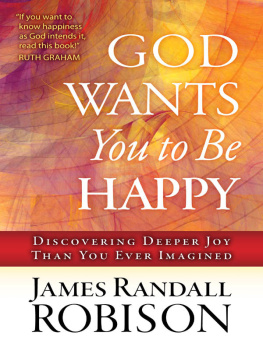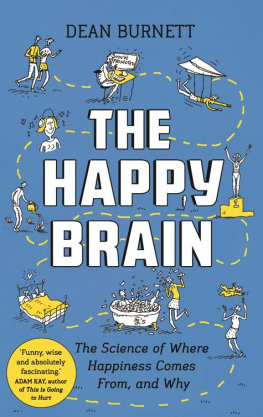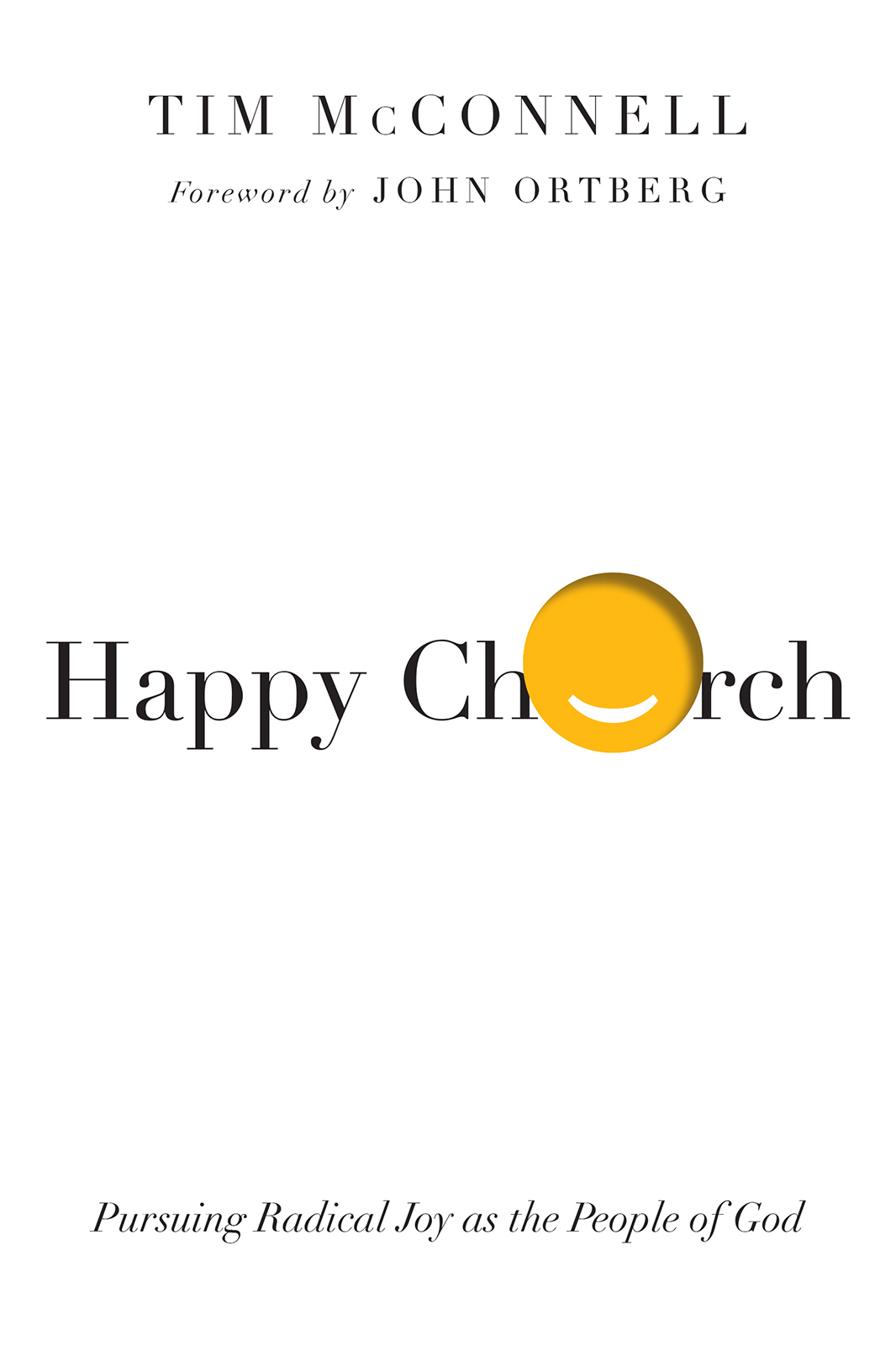Pursuing Radical Joy as the People of God
TIM McCONNELL
Foreword by JOHN ORTBERG

InterVarsity Press
P.O. Box 1400, Downers Grove, IL 60515-1426
ivpress.com
2016 by Tim McConnell
All rights reserved. No part of this book may be reproduced in any form without written permission from InterVarsity Press.
InterVarsity Pressis the book-publishing division of InterVarsity Christian Fellowship/USA, a movement of students and faculty active on campus at hundreds of universities, colleges and schools of nursing in the United States of America, and a member movement of the International Fellowship of Evangelical Students. For information about local and regional activities, visit intervarsity.org.
Scripture quotations, unless otherwise noted, are from The Holy Bible, English Standard Version, copyright 2001 by Crossway Bibles, a division of Good News Publishers. Used by permission. All rights reserved.
While any stories in this book are true, some names and identifying information may have been changed to protect the privacy of individuals.
Cover design: David Fassett
ISBN 978-0-8308-9369-0 (digital)
ISBN 978-0-8308-4456-2 (print)
Library of Congress Cataloging-in-Publication Data
Names: McConnell, Tim, 1973
Title: Happy church : pursuing radical joy as the people of God / Tim
McConnell ; foreword by John Ortberg.
Description: Downers Grove : InterVarsity Press, 2016. | Includes
bibliographical references. | Description based on print version record
and CIP data provided by publisher; resource not viewed.
Identifiers: LCCN 2015036061 (print) | LCCN 2015037231 (ebook) | ISBN
9780830893690 (eBook) | ISBN 9780830844562 (pbk. : alk. paper)
Subjects: LCSH: Happiness--Religious aspects--Christianity. | Church. |
Christian life.
Classification: LCC BV4647.J68 (print) | LCC BV4647.J68 M38 2016 (ebook) |
DDC 253--dc23
LC record available at http://lccn.loc.gov/2015036061
For Abigail,
my companion in joy.
Contents
Foreword
John Ortberg
I f we were to look at the average Christian, and (reasonably) assume that we are trying to learn from God to be like God, we might assume that God is a relatively grumpy being. We are so grumpy ourselves that we would have to assume our God is miserable. Gandhi reportedly said, I like your Christ, I do not like your Christians. Your Christians are so unlike your Christ. I like your Christ; I just dont like your Christians. Christians, what kind of Christ are we reflecting?
God is not a grumpy God. God created all things out of nothing by sheer love. God made everything good and beautiful just because he wanted it that way. God is a joy-loving and a joy-giving God.
Jonathan Edwards taught that God is happy. He said, The whole of Gods internal good or glory is in these three things, his infinite knowledge, his infinite virtue or holiness, and his infinite joy and happiness. God is all-knowing, all-righteousand all happy! Hes not just omniscient and omnipresent and omnipotent, hes omnicelebrant. Our relationship with God is a gift. It is the gift God gives that we get to participate in these aspects, these attributes of God: knowledge, virtue and joy. We get to know God, we get to receive transforming power to be made holy like God over time, and we get to participate in Gods joyGods happiness. God communicates these aspects of himself to us in his glory, and we return them with praise.
One of the primary purposes of the church, one of the main reasons why God has placed a church on earth and gathered us up to be a part of it, is so the world can know who he is by looking at the people he redeems and gathers.
Do our gatherings reflect a fundamentally happy and joyful God? Can you taste and see that the Lord is good when you gather in Christian fellowship at your church? Does your church stand out in your community as a refuge of gladness, a bastion of joy, a reservoir of happiness? Are you participating in the joy of God?
The truth is, we who are leaders have a lot to say about the tone and culture of our church. And Im not merely talking to pastors here but teachers and small group leaders, worship leaders, Bible study facilitators, youth group counselors, nursery workers, moms and dads and big brothers and little sisters and pew sitters and even the guy who just came because his friend forced him after he lost a bet on a round of golf. All of us. We all contribute. We all play a part to make the church the church. Is it a happy church? God is a joy-giving God.
Ive not only read Tims book but I get to work with him on a regular basis. He has spent a lot of time reading smart thinkers from periods of the history of the church I have only heard about in seminary! I love the way his brain works, and Im so grateful for this resource he has put together for us to examine our life together as the body of Christ.
There is deep meaning to the things we do together as a church. These things all have deeper meaning, and just to remind ourselves of what were doing when we gather, and we sing, and we pray, and we read Scripture, and we laugh, and we cryjust to sit back and think about the meaning of these is so refreshing. Its renewing. Its joy giving and hope filling.
Reading Tims book changed the way I lead. I want to lead a happy people of God, and that means I want to lead with more joy, more happiness, more exuberance because of what Christ has done for us. Its important. It reflects a joyful God when the people of God celebrate joy.
Read it. And stop being such a grump.
Happy the people whose God is the L ORD !
Psalm 144:15 RSV
Preface
H appy church is a risky term. Staid Christians have been trained not to use the word happy to describe the Christian faithits too flighty. And to the outsider or nonbeliever happy church sounds like an oxymoron. Happy church? Ive never seen one!
God made the church to be a resource for joy, a repository of gladness and a manifestation of happiness rooted in heaven.
The church is countercultural from its inception. It did not emerge from the world in the natural course of history. It is not a product of human advances, like democracy or the technological revolution. The church does not owe its birth to the world, and its destiny does not depend on human progress. For this reason the community of faith we call the church always runs against the grain of the culture in which it sits. It is radically countercultural. Its goals are different from the worlds goals, its values are different from the worlds values, and its happiness is different from the worlds happiness. The happy church is the people of God in pursuit of a radical joy, not dependent on this world and its ways.













